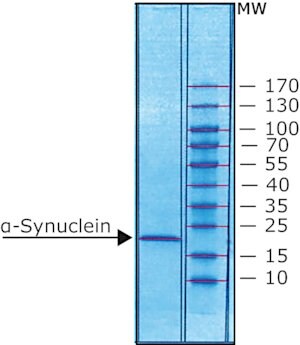S1071
α-Synuclein A53T human
recombinant, expressed in E. coli, N-terminal histidine tagged, ≥90% (SDS-PAGE), lyophilized powder
Sign Into View Organizational & Contract Pricing
All Photos(1)
About This Item
Recommended Products
recombinant
expressed in E. coli
Quality Level
Assay
≥90% (SDS-PAGE)
form
lyophilized powder
UniProt accession no.
shipped in
dry ice
storage temp.
−20°C
Gene Information
human ... SNCA(6622)
General description
α-Synuclein is mapped to human chromosome 4q22.1. It is an intrinsically disordered protein with N-terminal imperfect repeats (KTKEGV), a central NAC crucial for aggregation and an acidic rich flexible C-terminal region.α-Synuclein is present in the Lewy bodies (LBs) and Lewy neurites (LNs).
Application
α-Synuclein A53T human has been used to treat mesencephalic neuronal and stimulate microglial cells prior to reactive oxygen species (ROS) measurement, immunohistochemistry and imaging studies.
Biochem/physiol Actions
α-Synuclein (α-Syn) interacts with toll-like receptor 2 (TLR2) and mediates interleukin-1β (IL-1β) synthesis.
A point mutation in the α-synuclein gene, A53T (Ala53-Thr), is linked to familial Parkinson′s disease.
A point mutation in the α-synuclein gene, A53T (Ala53-Thr), is linked to familial Parkinson′s disease. Mice expressing A53T human α-synuclein, but not wild-type or the A30P variants, develop adult-onset neurodegenerative disease with a progressive motoric dysfunction leading to death.
Storage Class Code
11 - Combustible Solids
WGK
WGK 3
Flash Point(F)
Not applicable
Flash Point(C)
Not applicable
Personal Protective Equipment
dust mask type N95 (US), Eyeshields, Gloves
Choose from one of the most recent versions:
Already Own This Product?
Find documentation for the products that you have recently purchased in the Document Library.
Mehmet Ozansoy et al.
Molecular neurobiology, 47(2), 460-465 (2012-11-28)
Parkinson's disease (PD) is the second most common neurodegenerative disorder, defined by the presence of resting tremor, muscular rigidity, bradykinesia, and postural instability. PD is characterized by the progressive loss of dopaminergic neurons within the substantia nigra pars compacta of
Human alpha-synuclein-harboring familial Parkinson's disease-linked Ala-53? Thr mutation causes neurodegenerative disease with alpha-synuclein aggregation in transgenic mice
Lee MK, et al.
Proceedings of the National Academy of Sciences, 99(13), 8968-8973 (2002)
Laura Rueda-Gensini et al.
Frontiers in pharmacology, 13, 905347-905347 (2022-07-16)
Plant-derived products have gained considerable attention as inflammation modulators given the wide variety of anti-inflammatory phytochemicals reported to be present in plants and their limited side effects in vivo during prolonged exposure periods. Non-centrifugal cane sugar (NCS) has been identified
Muhammad Abdul Alim et al.
Journal of Alzheimer's disease : JAD, 6(4), 435-442 (2004-09-04)
Alpha-synuclein is a major constituent of pathological intracellular inclusion bodies, a common feature of several neurodegenerative diseases. Two missense mutations in the alpha-synuclein gene have been identified in confirmed autosomal-dominant familial Parkinson's disease, which segregate with the illness. However, the
Michael K Lee et al.
Proceedings of the National Academy of Sciences of the United States of America, 99(13), 8968-8973 (2002-06-27)
Mutations in alpha-synuclein (alpha-Syn) cause Parkinson's disease (PD) in a small number of pedigrees with familial PD. Moreover, alpha-Syn accumulates as a major component of Lewy bodies and Lewy neurites, intraneuronal inclusions that are neuropathological hallmarks of PD. To better
Our team of scientists has experience in all areas of research including Life Science, Material Science, Chemical Synthesis, Chromatography, Analytical and many others.
Contact Technical Service








